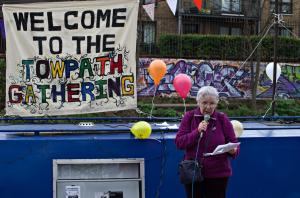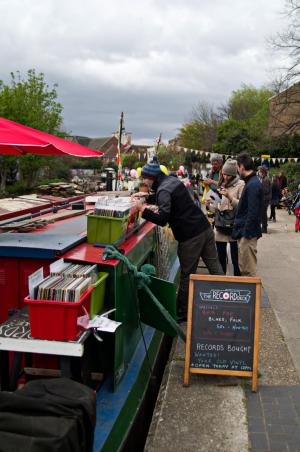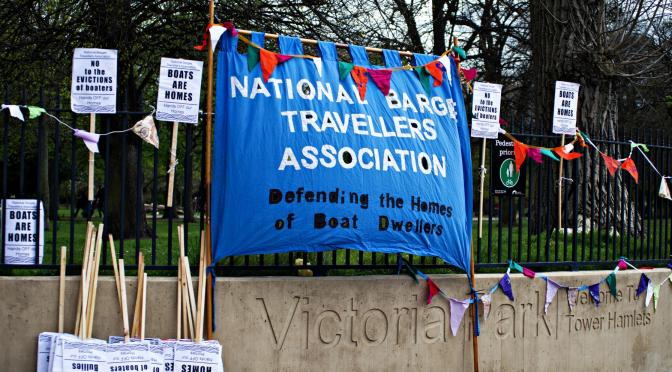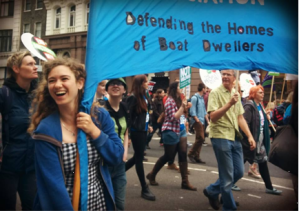Monthly Archives: July 2015
News Article: London rents crisis: A home on the city’s canal boats and the zen of emptying the ‘s**t box’
Newsletter Article: ALL STICK, NO CARROT
 Boater article
Boater article
The serene surroundings of Cheshunt’s Lea Valley were interrupted when a man employed by CRT to collect their rubbish began swearing violently at a bin that looked like it had exploded.
This new spot for a congregation of boaters, not because of their new-found love for Cheshunt, but as a result of CRT’s policy of forcing boats to ‘increase their range’ and with nowhere to dump their household rubbish the trash of a dozen boats was being crammed into a container the size of a large pedal bin. What was needed was something ten times the size. If a tap and an Elsan were located here the boaters in Cheshunt would have found themselves in canal heaven.
Facilities are scarce
CRT says it’s ‘committed to…improving facilities for boaters’. A Better Relationship Group (BRG) was formed for boaters to discuss concerns with CRT. Facilities are second on the group’s list of objectives (increased moorings being the first and increased enforcement being the last). The need for far more facilities cannot be denied, particularly west of Paddington. CRT’s own survey of ‘London’ facilities, from Bishops Stortford in the north to Cowley and Brentford in the south west (a lot of canal) revealed how poor facilities are; 9 Elsans, 15 taps, 5 pump outs, 9 rubbish points and 5 WCs, and some of these scarce facilities, such as the pump-out at Stonebridge lock are in poor working order, or are in complete disrepair, as is the case of the WC at Victoria Park which is now a distant memory.
More boaters = more facilities?
The increasing number of boats (14% in 2013 and 10% in 2014) means more revenue for CRT and should mean more facilities. CRT and BRG made some very modest proposals; 3 new pump outs, 2 new Elsans, 3 new water points and 4 oil collection points, but none of this work has been carried out.
CRT neglect
What is stopping CRT? They’ve admitted new facilities are necessary, they have the money, with a surplus of funds in 2014. If they were as pro-active about taps, bins and Elsans as they are about ‘enforcement’ there would be facilities at every other lock. Is it incompetence or some kind of ‘benign neglect?’ My own experience of their administration has convinced me they are incompetent. As someone once said, it’s like Kafka meets the Marx Brothers.
There is a hypocritical corporate mentality at work. Behind the marketing machine with its cuddly website, the pretty signs and volunteers strategically placed at Camden for the tourist, behind the image of a progressive organisation that cares about boaters and the environment, is an antagonism to an alternative lifestyle and utter indifference to recycling and issues around housing. At the same time individual boaters, who are paying a licence fee, are subjected to the kind of monitoring usually associated with a police state and denied the facilities that every household in the country has a legal right to; a water supply that is easily accessed and rubbish disposal that is not a health hazard.
CRT has said that it intends to, ‘educate boaters about cruising requirement’, but ‘continuous cruising’ requires actually facilities and not mere lip service to the idea of better facilities, in this respect it is CRT which is in need of education and not the boating community.
Newsletter Article: LAUNCH OF NEW CASE WORKER GROUP
NBTAL

The London branch of the National Bargee Traveller Association (NBTAL) has launched a new case-worker group in a bid to help London boaters who are affected by enforcement and the new Canal and River Trust (CRT) policy on refusing licences.
How can they help?
The case worker group keeps up to date with pooled knowledge of the current implementation of the new enforcement policy and the legal framework under which the policy sits, and can give assistance on ‘how far is far enough’ questions, re-licensing, sighting data queries, benefits, disability allowances and adjustments and other related advice.
Enforcement policy & ‘restricted’ licences
After a trial period when the new policy only affected new boaters on their first licence, CRT has recently announced that the new enforcement policy came into action for all boaters on the 1st May. Anyone having their licence renewed after that will fall under the new policy. CRT have stated that if a licence is renewed after the 1st May, they will look back over the previous year and make a decision as to whether you fit their current definition of “moving far enough and often enough”. If the boater fails this test they will refuse to renew their licence and will tell the boater to take a home mooring or remove their boat from the waters. If the boat isn’t removed and
is a live-aboard, then the next step is they will likely take the boater to court for having no licence and to seize the boat and remove it from the canal.
For an unspecified trial period, CRT are offering temporary 3 or 6-month “restricted” licences to affected boaters so they can “mend their ways”. This offer of restricted licences is “while boaters get used to the new regime”.
Fears
The NBTAL fears that in the future, CRT will simply refuse to renew licences with no restricted trial period offered. At a recent Canal User Group meeting, an NBTAL member asked the London enforcement manager how long the trial period would last and what happens afterwards and was told that “boaters would always be warned before we refuse to renew their licence.”
After a request from the NBTA, CRT have stopped charging premium rates for these “restricted” licences and the cost is now pro-rata to the full licence.
Volunteer case workers
Case workers can be contacted by email and are also available for a chat through a special helpline on 07974 298 958

Newsletter Article: BOATERS ADVICE
 WHAT DO I DO IF CRT REFUSES TO RENEW MY 12 MONTH LICENCE?
WHAT DO I DO IF CRT REFUSES TO RENEW MY 12 MONTH LICENCE?
Licences
CRT’s new enforcement policy has meant many boaters have had renewal of their 12 month licence refused and a 6 or 3 month license offered instead.
How far is ‘far enough’?
CRT stated on 6th March: “Whilst this means that we cannot set a universal minimum distance for compliance, we can advise that it is very unlikely that someone would be able to satisfy us that they have been genuinely cruising if their range of movement is less than 15-20 miles over the period of their license. In most cases we would expect it to be greater than this.
We will be advising those boaters without a home mooring whose range of movement falls short of this distance that their movement needs to increase or we may refuse to renew their licence.”
The policy is now three months old and hundreds of boaters have been affected.
Help!
If you are affected by this new enforcement policy, the first thing to do is:
Obtain your sighting data from CRT and check its accuracy. This is
the log they have of your movement during the previous licence period.
Subject Access Request
We’ve had recent reports that CRT will only provide your sighting data in response to a Subject Access Request under the Data Protection Act 1998. However, do try asking nicely for it as SAR’s can take up to 40 days. If CRT refuses to provide your data, email London Enforcement Manager Simon Cadek: Simon.Cadek@canalrivertrust.org.uk
Clearly mark the email as a ‘Subject Access Request’ and ask for your sighting data and any other information that CRT holds on you. CRT can lawfully charge you up to £10 for this.
Should I accept a restricted licence?
When faced with the ‘option’, you can either take the 6 or 3 month licence offered by CRT in time to get the prompt payment discount (if not paying by direct debit), or you can complain. If you are unhappy with being offered a restricted licence, we strongly advise you to make a formal complaint about the lack of warning and
opportunity given to remedy the situation and the retrospective application of this policy.
Make yourself heard
To lodge a Level 1 complaint, use the template provided on the Kanda website or contact the NBTA caseworkers for help.
Download the Canal and River Trust’s “MAKING A COMPLAINT” guide here.
Refusing a licence
We believe if you take the restricted licence, during that time CRT will expect you to travel in excess of a range of 15 to 20 miles or they won’t renew it without a home mooring. If you feel you will be unable to comply with this distance then DO NOT accept the license and seek legal help through nbtalondon@caseworker.com
It can be challenged through the courts. CRT’s new enforcement policy is highly unlikely to be considered lawful if you sit tight, are prepared for the stress of a court case and you have complied with the legislation and moved a reasonable amount at least every 14 days, as the the law (The 1995 British Waterways Act) does not specify a minimum distance that must be travelled to comply.
TOWPATH GATHERING
Sun day 19 April, NBTA hosted a family-friendly Towpath Gathering outside Victoria Park to celebrate the boating community whilst making a stand against CRT’s draconian new enforcement policy and recent licence refusals. Attracting over 200 people, the event sent a positive but pressing message – our colourful community is under threat.
day 19 April, NBTA hosted a family-friendly Towpath Gathering outside Victoria Park to celebrate the boating community whilst making a stand against CRT’s draconian new enforcement policy and recent licence refusals. Attracting over 200 people, the event sent a positive but pressing message – our colourful community is under threat.
 Boaters, supporters and local residents were given an insight into boating life with a floating marketplace where all were welcome to step onboard. From origami workshops, a museum, the Jam Butty and a record store, to live music, poetry and clown performances, visitors marvelled at the unique and eclectic mix of boaters, able to learn about the everyday lives of boat dwellers.
Boaters, supporters and local residents were given an insight into boating life with a floating marketplace where all were welcome to step onboard. From origami workshops, a museum, the Jam Butty and a record store, to live music, poetry and clown performances, visitors marvelled at the unique and eclectic mix of boaters, able to learn about the everyday lives of boat dwellers.
Speakers from NBTA explained the injustice and illegalities of CRT’s new measures, alongside speeches from Focus E15, Local Residents Association, Action East End and Radical Housing Network. Heartfelt words from individual boaters reiterated the seriousness of our campaign to stay on the waters, in an all-encompassing representation of who we are and why we refuse to be penalised
for “not moving far enough”.
 As the event drew to a close, there was a real sense of achievement and pride. The boating community is undeniably considered special and is treasured by many, proven by the extensive support from all who attended the event and all the stories shared.
As the event drew to a close, there was a real sense of achievement and pride. The boating community is undeniably considered special and is treasured by many, proven by the extensive support from all who attended the event and all the stories shared.
Newsletter Article: CRT WITHDRAW PREMIUM RATES ON RESTRICTED LICENSES!
 Following NBTA lobbying, CRT will only charge boaters forced to take a 3 or 6-month licence the 12-month fee pro rata instead of the advertised higher relative cost of its shorter licences.
Following NBTA lobbying, CRT will only charge boaters forced to take a 3 or 6-month licence the 12-month fee pro rata instead of the advertised higher relative cost of its shorter licences.
News: Two Documentaries in the making about CRT’s new policy looking for liveaboard boaters to interview
For those of you who live on Canal & River Trust waterways, BBC Inside Out South and Hardcash Productions want to hear from boaters without home moorings who have been refused a 12-month licence or who are affected by CRT’s new policy.
BBC Inside Out South is doing a feature on CRT’s new policy for boaters without home moorings. The producer has contacted the NBTA because they want to speak to any liveaboard boaters in their area (temporarily or permanently) who are affected by this, especially if you have been refused a 12-month licence in circumstances where your licence has been renewed without question for a number of years previously and you’ve had the same cruising pattern each year.
The areas that BBC Inside Out South covers where there are CRT waterways are Oxford, Berkshire and south east Wiltshire (it also covers Surrey, Sussex, Dorset, Hampshire and Isle of Wight). The programme is 30 minutes with three 10-minute reports. It is a weekly current affairs programme that looks behind the headlines. They are looking to film in July or August and this will be broadcast in September on a Monday evening at 7.30pm on BBC1.
Hardcash Productions are making a documentary for BBC or Channel 4 on how the new policy is affecting boaters. They are also looking for boat dwellers to interview. These are the kind of people they would like to interview:
1) People who are soon to have their licence renewed (next two months) and are worried whether it will be renewed.
2) Anyone involved in a court case with CRT.
3) People who have been on the receiving end of enforcement letters, which have made them anxious and where they dispute what is in the letters or had an altercation with enforcement officers.
4) People due to or thinking about moving onto land, or have already moved onto land, either voluntarily (as felt under too much pressure) or because they were evicted.
6) A family who live on the canals with young kids and could show how hard it is to keep moving.
7) Someone who is elderly or otherwise vulnerable because of disability or physical or mental ill-health – how are they coping with all the stress?
If you are interested in being filmed by either BBC or Hardcash, please contact the NBTA: secretariat@bargee-traveller.org.uk or 0118 321 4128 – ideally THIS WEEK (by 17th July 2015) please if possible – and we will pass your details on.
Thank you.
Best regards,
Nick Brown
Secretary
News Article: Canalboats become the new property must-haves for Londoners who can beat soaring house prices and rent s by snapping up a home for just £10,000
News Article: What would make London a fairer city?
A glittering global capital that attracts investment and an emblem of a housing crisis with a quarter of residents living in poverty. Is London fair? The London Fairness Commission wants to hear your thoughts on what would make it better
http://www.theguardian.com/cities/2015/jul/13/what-would-make-london-fairer-city-fairness-commission



